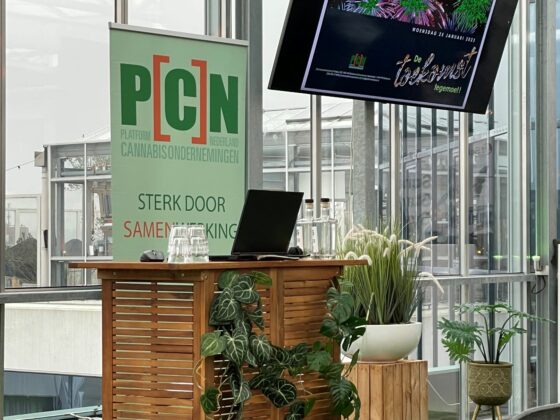Stamp of approval? Row about quality certificate for coffeeshops


Cannabis sellers are developing a national quality certification for coffee shops to improve their relationship with local government and the law.
The PCN, a trade union which represents shop owners, told members at a spring meeting about plans to develop the certificate – which would be independently run and accredited.
Hein Schafrat, spokesman for the PCN board said it would be a logical step in ‘professionalising’ the sector. ‘We want to show that our members are trustworthy partners in a transparent way,’ he said in a statement. ‘Not just for clients…Our partners are also trustworthy partners for the people who run councils where their shops are based, and for their neighbourhoods.’
The business is concerned that a crackdown on criminality will affect their trade and that a trial of regulated cannabis growing – voted through government in 2019 – has stalled before it has even started. Coffee shops, which sell cannabis for on and off-site consumption, currently operate in a legal grey area and buy from criminals, since commercial growing is illegal.
‘The PCN board sees a quality assurance mark as the next logical step in commercialising the coffee shop sector,’ said Schafrat at the meeting in Woerden.
Standards
The aim of the certification would be to set training standards for employees, stop under-age access to cannabis and potentially enable more product quality control said Gerlof Roubos, director of Pragma Advies consultancy.
He cited the examples of an anti-squatting certification in empty building management and the Fair Produce certification to guarantee working standards in the (non-hallucinogenic) mushroom growing sector. A certification would include regular inspections, training, and an independent standards body.
‘With the empty buildings, there was a negative image, the sector wanted to avoid legislation and wanted protection for people living in the buildings,’ he said. ‘Now, most importantly, government property organisations, housing corporations and municipalities and that people require that quality certificate to manage their property.
‘Right now, people read the papers and think they don’t want to have coffee shops. But with self-regulation, you could build both quality and trust.’
Image
Wilco Sijm, who started a quality certification in Haarlem, said that it meant a better and more professional relationship between the city council and the 16 coffee shops. ‘I was cynical – I thought, would they just be checking the toilets?’ he told Dutch News.
‘But it’s a legal framework, we have our own testing facility which allows us to sift out non-quality produce in the spirit of trying to raise standards and improve the image of the industry. We are seen as a more equal partner with the council.’
But some are less enthusiastic. Simone van Breda, chair of another trade union the BCD, said it had already spent two years developing its own quality standards, in collaboration with the Dutch government. Others pointed out that there wasn’t much point to a certification of coffee shops if cannabis itself was not properly legal and regulated. ‘In the ideal situation, you have both certified cannabis and certified coffee shops,’ said BCD contributor Hester Kooistra.
August van Loor, director of the Adviesburo Drugs in Amsterdam, said that since cannabis is not fully legal in the Netherlands, a quality mark would ‘raise more questions than it solves…and double the schizophrenia.’
Thank you for donating to DutchNews.nl.
We could not provide the Dutch News service, and keep it free of charge, without the generous support of our readers. Your donations allow us to report on issues you tell us matter, and provide you with a summary of the most important Dutch news each day.
Make a donation